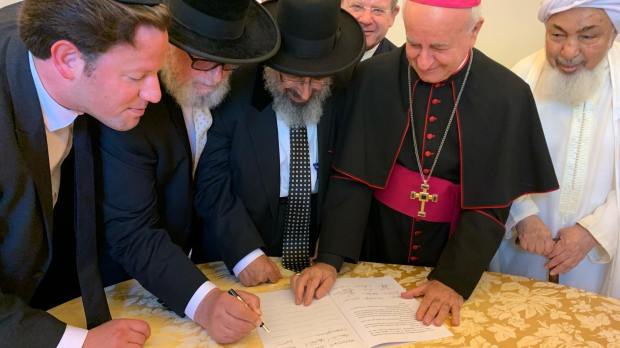Catholic, Jewish and Muslim leaders presented Pope Francis on Monday with a signed document stating their total opposition to euthanasia and assisted suicide.
The paper stated that “the three Abrahamic monotheistic religions share common goals and are in complete agreement in their approach to end-of-life situations.”
“We oppose any form of euthanasia – that is the direct, deliberate and intentional act of taking life – as well as physician assisted suicide – that is the direct, deliberate and intentional support of committing suicide – because they fundamentally contradict the inalienable value of human life, and therefore are inherently and consequentially morally and religiously wrong, and should be forbidden without exceptions,” the document said.
“Any pressure upon dying patients to end their lives by active and deliberate actions is categorically rejected,” it continued.
The document was presented to Pope Francis during an audience with the pontiff, and was signed by David Rosen for the American Jewish Committee, Vincenzo Paglia for the Vatican, a representative for the Orthodox Church, and Samsul Anwar from the Indonesian Muhammadiyah, an Islamic social and cultural association, according to a report in The Times of Israel.

Read more:
3 Common questions in end-of-life care
The inspiration for the joint document came from Rabbi Avraham Steinberg, co-president of the Israeli National Council on Bioethics, who proposed it to Pope Francis who then tasked the Pontifical Academy for Life with drafting the document, reported the Catholic News Agency.
The paper also stated the leaders’ support for health care providers’ rights to refuse to participate in assisted suicides.
“No health care provider should be coerced or pressured to either directly or indirectly assist in the deliberate and intentional death of a patient through assisted suicide or any form of euthanasia, especially when it is against the religious beliefs of the provider,” it stated.
The document affirmed the need for providing palliative care for dying patients and for raising awareness about options available to relieve suffering.
Noting that the religious principles are “not always in accord with the current secular humanistic values and practices,” the leaders called on health-care decision makers to educate themselves on religious teaching as regards assisted suicide.
“We call upon all policy-makers and health-care providers to familiarize themselves with this wide-ranging Abrahamic monotheistic perspective and teaching in order to provide the best care to dying patients and to their families who adhere to the religious norms and guidance of their respective religious traditions,” said the paper.

